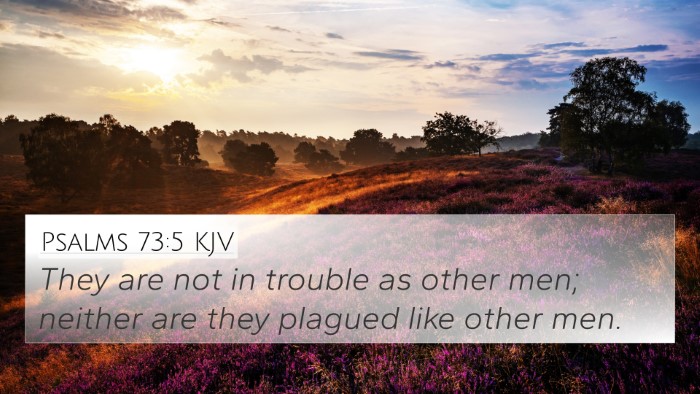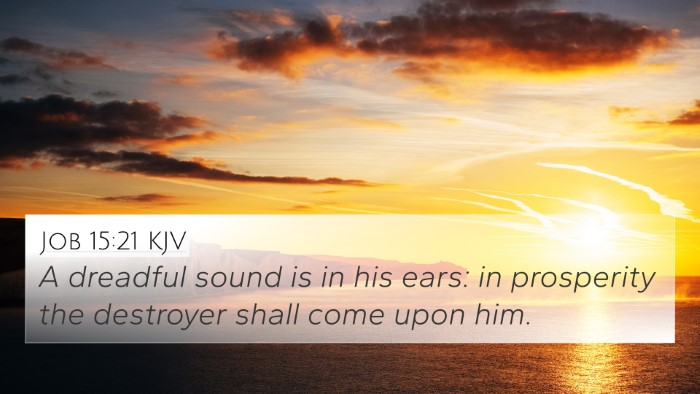Understanding Job 21:9
Job 21:9 states: "Their houses are safe and free from fear; the rod of God is not upon them." This verse captures the essence of Job's dialogue and his defense against the complacent view of suffering prevalent in his friends' arguments. Below is a comprehensive analysis of this verse, drawing insights from public domain commentaries.
Summary of Insights
This verse signifies the apparent peace and security of the wicked, raising questions about the justice of God. Job challenges the widely held belief that prosperity is a sign of divine favor, suggesting instead that the absence of immediate punishment does not equal righteousness.
Key Themes and Concepts:
- The prosperity of the wicked: Job points out that many who live unrighteous lives seem to prosper without fear of divine punishment.
- The silence of God: The verse highlights God's apparent inaction towards the wicked, leading to a sense of injustice.
- Human perception of justice: Job's statement challenges the conventional understanding among his friends that suffering is always a consequence of sin.
Commentary Insights
In analyzing this verse, we draw insights from various notable commentaries:
-
Matthew Henry:
Henry notes that Job's assertion reveals the folly of assuming that financial and physical comfort is evidence of God's approval. The wealthy whose lives seem untroubled are often unaware of their spiritual peril.
-
Albert Barnes:
Barnes expounds on the idea that the "rod of God" signifies divine chastisement. He emphasizes that the seeming absence of punishment for the wicked should not be misconstrued as lack of accountability; rather, it is an opportunity for repentance that might not be taken.
-
Adam Clarke:
Clarke adds depth by discussing the temporal nature of prosperity. He encourages readers to understand that earthly comfort does not equate to spiritual well-being and, ultimately, earthly rewards can be misleading.
Cross-References
Job 21:9 connects with several other biblical verses, further illustrating its themes:
- Psalm 73:3-5: "For I was envious of the arrogant when I saw the prosperity of the wicked." This verse echoes Job’s sentiment about the prosperity enjoyed by the wicked.
- Proverbs 24:19: "Fret not yourself because of evildoers, and be not envious of the wicked." This also reflects the struggle with observing the wicked's success.
- Ecclesiastes 8:14: "There is a vanity that takes place on earth, that there are righteous people to whom it happens according to the deeds of the wicked, and there are wicked people to whom it happens according to the deeds of the righteous." This speaks to the seeming injustice in the world.
- Luke 16:25: "But Abraham said, 'Child, remember that you in your lifetime received your good things, and Lazarus in like manner bad things; but now he is comforted here, and you are in anguish.'" This highlights the eventual reversal of fortunes.
- Malachi 3:15: "And now we call the arrogant blessed. Evildoers not only prosper but they put God to the test and escape." This reinforces the observation of the wicked prospering.
- Romans 2:5-6: "But because of your hard and impenitent heart you are storing up wrath for yourself on the day of wrath when God’s righteous judgment will be revealed." This points to future accountability for the wicked.
- 2 Peter 2:9: "Then the Lord knows how to rescue the godly from trials, and to keep the unrighteous under punishment until the day of judgment." This emphasizes God's awareness of justice.
Deepening Understanding through Connections
Connecting Job 21:9 with these other verses enables deeper insights into the nature of God's justice and the realities of life. By exploring these scriptural cross-references, readers can glean a richer understanding of the text and the physical and spiritual dynamics it represents.
In pursuit of a comprehensive understanding, one can use Bible reference resources such as a Bible concordance or a cross-reference guide to enhance their study. These tools aid in visualizing and identifying connections between Bible verses, helping to bridge the gap between the Old and New Testaments, as well as revealing thematic connections.
Conclusion
Job 21:9 serves as a critical reminder to examine our assumptions about prosperity, suffering, and God’s justice. By engaging with related scriptures, one can appreciate the complexity of these themes and find guidance in the biblical narrative. Utilizing structured cross-references aids in navigating these rich theological discussions and enhances sermon preparation, personal study, and group discussions.








